Contents
| |
1974 • 1975 •1976 • 1977 • 1978 |
| Decades: |
| See also: History of Macau |
Events from the year 1976 in Portuguese Macau .
| |
1974 • 1975 •1976 • 1977 • 1978 |
| Decades: |
| See also: History of Macau |
Events from the year 1976 in Portuguese Macau .
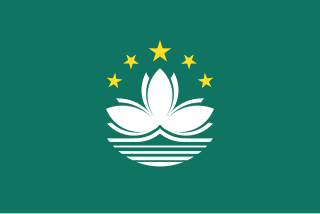
Macau or Macao is a special administrative region of the People's Republic of China. With a population of about 680,000 and a land area of 32.9 km2 (12.7 sq mi), it is the most densely populated region in the world.
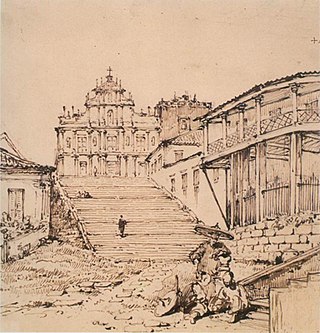
Macau is a special administrative region (SAR) of the People's Republic of China. It was leased to Portugal in 1557 as a trading post in exchange for a symbolic annual rent of 500 tael. Despite remaining under Chinese sovereignty and authority, the Portuguese came to consider and administer Macau as a de facto colony. Following the signing of the Treaty of Nanking between China and Britain in 1842, and the signing of treaties between China and foreign powers during the 1860s, establishing the benefit of "the most favoured nation" for them, the Portuguese attempted to conclude a similar treaty in 1862, but the Chinese refused, owing to a misunderstanding over the sovereignty of Macau. In 1887 the Portuguese finally managed to secure an agreement from China that Macau was Portuguese territory. In 1999 it was handed over to China. Macau was the last extant European territory in continental Asia.
The Macanese people are a multiracial East Asian ethnic group that originated in Macau in the 16th century, consisting of people of predominantly mixed Cantonese and Portuguese as well as Malay, Japanese, English, Dutch, Sinhalese, and Indian ancestry.

Taipa is an area in Macau, connected to Coloane through the area known as Cotai, which is largely built from reclaimed land. Located on the northern half of the island, Taipa’s population is mostly suburban. Administratively, the boundaries of the traditional civil parish Freguesia de Nossa Senhora do Carmo are mostly coterminous with that of the former Taipa Island, except for a portion of the parish that lies on the island of Hengqin (Montanha), housing the campus of the University of Macau.

The Macau Peninsula is the historical and most populous part of Macau. It has an area of 8.5 square kilometers (3.3 sq mi) and is geographically connected to Guangdong Province at the northeast through an isthmus 200 meters (660 ft) wide. The peninsula, together with downtown Zhuhai, sits on an island separated from the continent by distributaries of the Pearl River. The Border Gate was built on the northern isthmus. At the south, the peninsula is connected to Taipa Island by three bridges, the Friendship Bridge ; the Macau-Taipa Bridge ; and the Sai Van Bridge . The longest axis extends 4 kilometers (2.5 mi) from the Border Gate to the southwestern edge, Barra (媽閣嘴). There is a western "Inner Harbor" (內港) paralleled by an "Outer Harbor" (外港) to the east. The 93 meters (305 ft) Guia Hill (松山) is the highest point on the peninsula, which has an average elevation of 50 to 75 meters. Many coastal places are reclaimed from the sea. The Historic Centre of Macau, which is entirely on the Macau Peninsula, became a World Heritage Site in 2005.
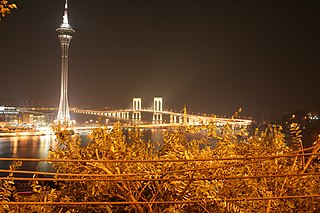
Sé is a southeast civil parish in the Macau Peninsula of Macau. It is the second largest peninsular district in Macau after the civil parish of Nossa Senhora de Fátima. The parish area is named for the Igreja da Sé.

The Macau national football team represents the Chinese special administrative region of Macau in international association football. The team is supervised by the Macau Football Association. The Macau football team has a ranking that is one of the lowest among the FIFA members. Although usually known as simply Macau, the EAFF refers to the team as Macau, China.
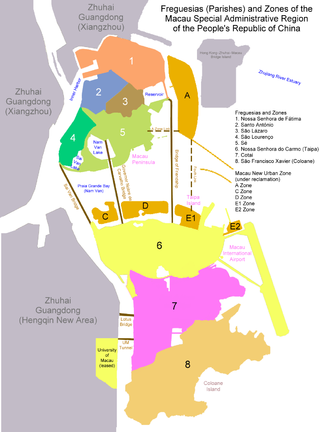
By the end of Portuguese rule, Macau was administratively divided into two municipalities and seven civil parishes. Parishes were administrative subdivisions of the municipalities. After the 1999 handover to China, parishes are still officially recognized divisions but for symbolic reasons only.

The Macau Football Association is the governing body of association football in Macau SAR of China.

The Macau Light Rapid Transit is a mass transit system in Macau and is also the first railway system in Macau. The first phase of the project started construction in February 2012, and the first section of the Taipa line was opened to the public on 10 December 2019, followed by the Barra Station Extend Line on 8 December 2023. MTR (Macau), a wholly-owned subsidiary of MTR, was operating and maintaining the MLRT under the operations and maintenance assistance services, until it expires in December 2024. Macao Light Rapid Transit Corporation, Limited (MLM) is directly responsible for the operations and maintenance assistance services of the MLRT from 1 April 2024.

The handover of Macau from the Portuguese Republic to the People's Republic of China was at midnight on 20 December 1999. This event ended 442 years of Portuguese rule in the former settlement, which began in 1557.
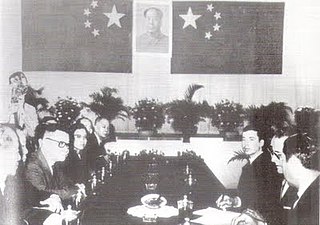
The 12-3 incident was a series of political demonstrations and riots against Portuguese colonial rule in Macau which occurred on December 3, 1966. The incident, inspired by the Cultural Revolution in the People's Republic of China, occurred as a direct response to a violent police crackdown by colonial authorities against local Chinese protesters demonstrating against corruption and colonialism in Macau.

The Government of the Macau Special Administrative Region allows citizens of specific countries/territories to travel to Macau for tourism or business purposes for periods ranging from 14 to 180 days without having to obtain a visa. For other entry purposes, such as establishing residence on a long-term basis, a different policy applies.

Lesbian, gay, bisexual, and transgender (LGBT) persons in Macau, a special administrative region of China, face legal challenges not experienced by non-LGBT residents. While same-sex sexual activity was decriminalized in 1996, same-sex couples and households headed by same-sex couples remain ineligible for some legal rights available to opposite-sex couples.

The Public Security Police Force is the non-criminal police department of Macau and a branch of the Macau Security Force. Originally known at first as the Macau Police, the force went through several name changes before taking on its current name. The PSP celebrates its foundation on 14 March 1691.

The House of Sport Lisboa e Benfica in Macau, simply known as Benfica de Macau, is a Macanese professional football club that currently competes in the Liga de Elite. They are the five-time champions of the league.

Macau was a Portuguese colony from the establishment of the first official Portuguese settlement of Macau in 1557 to its handover to China in 1999. It comprised the Municipality of Macau and the Municipality of Ilhas. Macau was both the first and last European holding in China.

The Macau Economic and Cultural Office is the representative office of Macau in the Republic of China. Its counterpart body in Macau is the Taipei Economic and Cultural Office in Macau.
The 2019 Taça de Macau was the 2019 iteration of the Taça de Macau, the top football knockout competition in Macau. It is organized by the Macau Football Association.

The 2019 FIA GT World Cup was a Grand Touring (GT) sports car race held on the Guia Circuit in Macau on 17 November. It was the fifth edition of the FIA GT World Cup and the twelfth GT3 car race to be held in Macau. The event promoter, the Automobile General Association Macau-China, appointed the motorsports organiser Stéphane Ratel Organisation (SRO) to form a grid. The edition itself was made up of two races: a 12-lap qualifying race and an 18-lap main event.